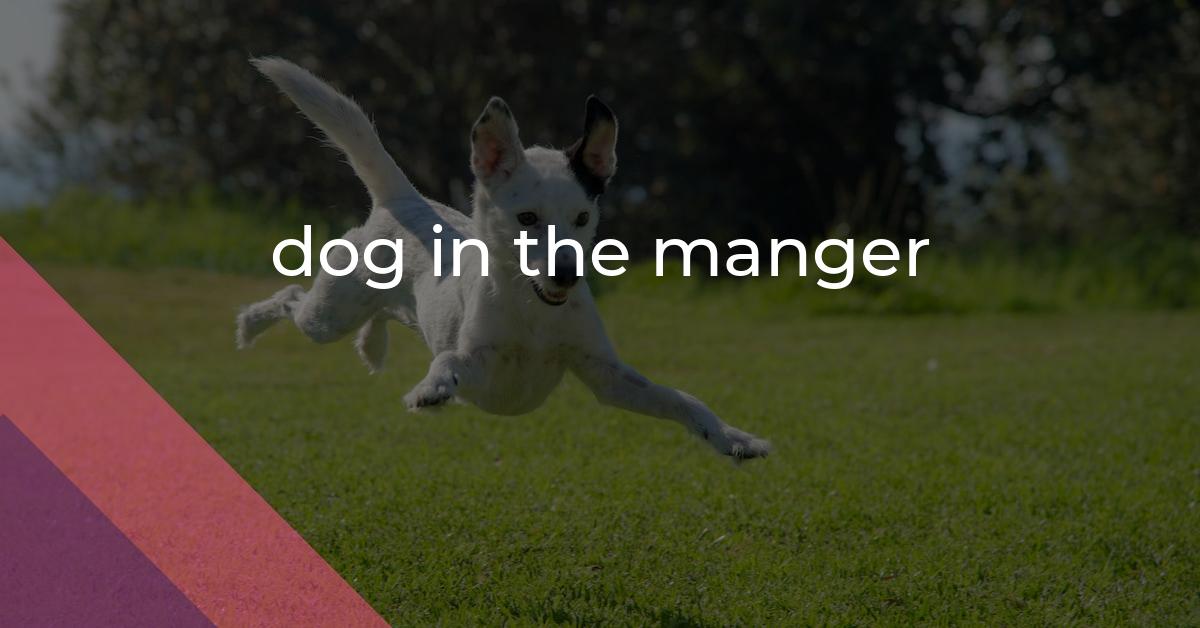dog in the manger: Idiom Meaning and Origin
What does ‘dog in the manger’ mean?
The idiom "dog in the manger" refers to someone who selfishly prevents others from enjoying or using something that they themselves do not need or want.

Idiom Explorer
The idiom "tail wagging the dog" means a small or unimportant thing or person controlling a larger or more powerful thing or person. It refers to the idea of a dog being controlled by its tail, instead of the tail being controlled by the dog.
The idiom "junkyard dog" refers to someone who is fiercely protective and aggressive in defending their territory or interests. It conveys the idea of toughness and tenacity, often used to describe individuals who are always ready to fight back or stand up for themselves.
The idiom *don't shit where you eat* means to avoid creating problems or conflicts in a place or situation that is important or beneficial to you.
The idiom "dog that caught the car" refers to someone who has achieved a goal but is uncertain about what to do next or ill-prepared to handle the situation. It emphasizes the feeling of being overwhelmed or unprepared for the consequences of one's actions.
The idiom "dog's life" refers to a difficult and unpleasant existence, often characterized by hardship, struggle, or mistreatment.
The idiom "dog's chance" refers to having very little or no possibility of success or survival in a given situation.
The idiom "dog's breakfast" means a muddled or chaotic situation, typically used to describe something poorly done or disorganized.
The idiom "dog my cats" means that someone is surprised or shocked by something. It is often used to express disbelief or astonishment.
"Dog around" means to wander aimlessly, without a specific purpose or direction. It can also refer to procrastinating or wasting time instead of being productive.
The Curious Implications
The origin of the idiom "dog in the manger" can be traced back to an ancient Greek fable. In this fable, a dog is resting in a manger filled with hay. Despite having no need for the hay, the dog refuses to let the oxen eat it, displaying possessiveness and selfishness. This story exemplifies the essence of the idiom, which is used to describe individuals who hoard or prevent others from accessing resources or opportunities for no apparent reason.
Although the exact origin and earliest recorded instances of the idiom are elusive, it has become a well-known expression in the English language. The idiom has been referenced in literature throughout history and is frequently used in everyday conversations. Renowned playwright William Shakespeare even made several references to the idiom in his works.
The idiom "dog in the manger" is often used metaphorically to criticize individuals who withhold something unjustifiably. It can refer to physical objects, positions, or intangible benefits. The idiom implies a moral judgment against those who prevent others from enjoying something they themselves have no use for. It highlights the negative consequences of possessiveness and selfishness.
One related idiom is "dog that caught the car." This idiom describes a situation where someone achieves their goal but realizes they don't know what to do next. It can be used to express the idea that success does not always bring fulfillment or satisfaction. In a way, this idiom reflects the shortsightedness exhibited by individuals who prioritize their own interests over the well-being of others.
Another related idiom is "dog in the hunt." This idiom refers to someone who is actively involved in a particular activity or pursuit. It implies that the individual is fully committed and engaged in the task at hand. In the context of the idiom "dog in the manger," this related idiom highlights the possessiveness and single-mindedness of individuals who prevent others from participating in or benefiting from a particular endeavor.
A third related idiom is "tail wagging the dog." This idiom describes a situation where a small or insignificant part controls or influences the whole. It implies that something is out of balance or that priorities are misplaced. In the context of the idiom "dog in the manger," this related idiom emphasizes the irrationality and misguided actions of individuals who prioritize their own interests over the well-being or fair treatment of others.
Lastly, there is the idiom "junkyard dog." This idiom refers to someone who is tough, relentless, and ready to defend their territory or possessions. It conveys the idea of being protective and not easily intimidated. In the context of the idiom "dog in the manger," this related idiom describes the possessiveness and aggression exhibited by individuals who refuse to let others enjoy or benefit from something they themselves have no use for.
The idiom "dog in the manger" and its related idioms offer a glimpse into human behavior and the consequences of possessiveness and selfishness. They remind us of the importance of considering others and the negative impact that hoarding or preventing others from accessing resources can have on individuals and society as a whole. By reflecting on these idioms, we are prompted to think about the value of altruism and the pitfalls of prioritizing our own interests over the well-being and fair treatment of others.
Example usage
Examples:
1. She had no interest in starting her own business, but she still refused to sell her father's company. It was like a dog in the manger situation.
2. The children desperately wanted to play with the new toy, but their older brother wouldn't let them touch it. He was being a dog in the manger.
3. The supervisor never used his vacation days and wouldn't let anyone else take time off either. He was acting like a dog in the manger.
More "Envy" idioms



